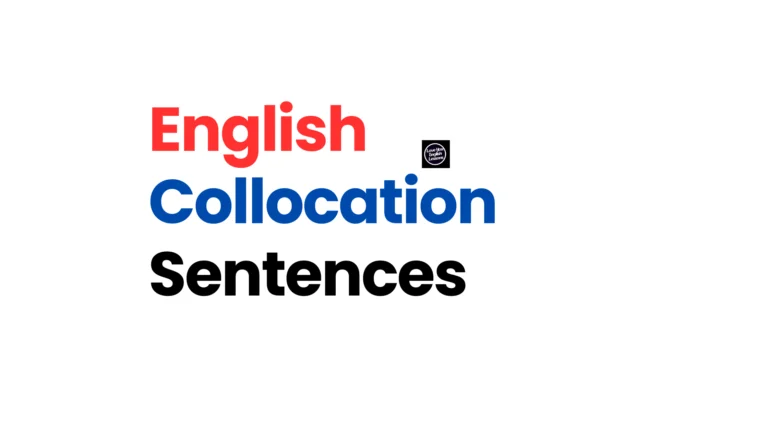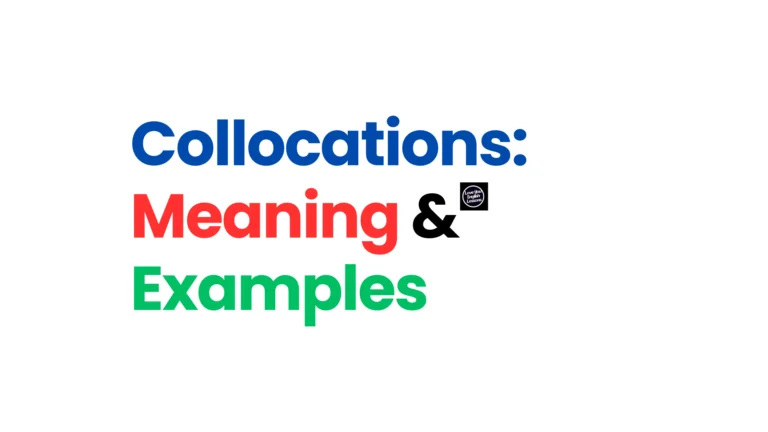The Essential Guide to English Collocation
Hello everyone,
Learning English can be a real challenge, especially when it comes to putting words together in the right way.
You may know a ton of vocabulary words, but if you don’t use them in the correct combinations, your English won’t sound natural.
That’s where collocations come in – they are words that naturally go together in a language.
Mastering collocations is key to sounding more fluent and native-like when speaking or writing English.
What Are Collocations?
A collocation refers to a group of words that are frequently used together and sound natural to native speakers.
For example, we say “heavy rain” not “strong rain”, and we “make a decision” rather than “do a decision”.
These word combinations just feel right to someone whose first language is English.
There are different types of collocations like:
Adjective + Noun (heavy rain, strong wind)
Verb + Noun (make a decision, do homework)
Noun + Noun (a piece of advice, a glass of water)
Verb + Preposition (look at, speak to)
Why Are Collocations Important?
Using the correct collocations is crucial for speaking and writing natural-sounding English.
If you get them wrong, your English may be understandable, but it will sound awkward and unnatural.
Getting collocations right shows mastery of vocabulary and makes your English more precise and idiomatic.
For example, saying “I did my homework” is perfectly fine, but saying “I made my homework” sounds very unnatural.
Or saying “a strong wind” instead of “a heavy rain” – it’s understandable, but doesn’t follow the natural patterns of English speech.
Improving your collocation skills has many benefits:
- Increases your fluency and natural speech flow
- Shows advanced vocabulary knowledge
- Helps you avoid awkward phrasing
- Makes your writing more precise and idiomatic
- Shows you have a good command of English
Collocations are one of the biggest hurdles for English learners of all levels.
Even quite advanced students often struggle to use accurate collocations consistently.
But mastering them is so important for reaching that next level of English proficiency.
Read more:
- 100+ English Collocations to Sound More Fluent
- 100+ English Collocations to Sound More Fluent
- 30 Common English Collocations You Should Know
- English Collocation Sentences
- Everyday English Expressions for Daily Use
How to Learn Collocations
Unfortunately, there isn’t one easy method to magically learn all the common collocations.
It takes consistent practice and exposure over time. However, here are some effective strategies to start improving:
1) Read, read, read
The more quality English reading you do, the more you’ll be exposed to common collocations in context. Try to notice which words naturally go together when you read books, articles, or other materials.
2) Use collocation dictionaries
There are special dictionaries that focus solely on listing common, natural word combinations in English. The Oxford Collocations Dictionary and BBI Combinatory Dictionary are two excellent resources.
3) Study example sentences
When learning a new vocabulary word, also study the example sentences to see what words naturally combine with it. For instance, if studying “mistake”, see examples like “make a mistake” or “a silly mistake.”
4) Make collocation notebooks/flashcards
Keep an ongoing written record of new collocations you discover. Write out the full word combination along with an example sentence. Review these regularly to reinforce the patterns.
5) Listen closely to native speakers
When consuming English audio or video, pay attention to how words are naturally combined by native speakers. Notice what sounds right or wrong to a fluent ear.
6) Get feedback
Ask native speakers, teachers, or editors to point out collocation errors. Getting this feedback and correction from experts is invaluable.
Learning collocations takes a lot of intentional study and practice over time.
But sticking with it yields huge benefits for sounding more natural and fluent.
Here are some final tips:
- Always learn vocabulary in full collocations, not single words
- Start by mastering the most common, frequent collocations first
- Learn collocations by topic or context (e.g. business, technology, relationships)
- Prioritize matching verb + noun collocation accuracy first
- Be patient – collocations take long-term effort to fully acquire
- The journey to collocation mastery isn’t easy, but it’s an extremely worthwhile investment.
By learning which English words naturally combine together in speech and writing, you’ll instantly elevate your language proficiency.
Your English will sound smoother, more precise, and much more natural overall.
Following the strategies above will put you on the path to developing this crucial English skill.
While it takes consistent effort, reaching collocation fluency allows you to fully master the flow and nuances of the English language.
________________________





